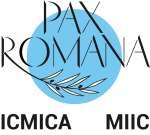
OFFICIAL NAME
Mouvement International des Intellectuels Catholiques
ACRONYM
ICMICA-MIIC
ALSO KNOWN AS
International Catholic Movement for Intellectual and Cultural Affairs - Pax Romana
ESTABLISHED
1947
HISTORY
Following the Second World War, intellectuals and graduates associated with Pax Romana (an international association of Catholic students, born in 1921 in Fribourg, Switzerland) saw the need for a distinct movement for the evangelisation of culture and the professional milieu. At Easter, 1947 in Rome, with the support of Pope Pius XII and the active participation of Giovanni Battista Montini (now Saint Paul VI), the Pax Romana movement reorganised into two associations: the International Movement of Catholic Students for university students (IMCS) and ICMICA for intellectuals, professionals and graduates.
As an international lay movement, ICMICA works for the formation of responsible lay leaders for the Church and the world. ICMICA played a leadership role in the Conference of International Catholic Organizations (1927-2007) and the networks organizing the three World Congress of the Lay Apostolate (1951, 1957, and 1967). At the end of 1959 in Manila, ICMICA co-organised with UNESCO the first international interfaith conference supported by the Holy See. During the Second Vatican Council, leaders of Pax Romana, including Rosemary Goldie, were selected as lay auditors at the assembly. Following Vatican II, ICMICA emphasised the role and responsibility of the laity in the world, with a specific concern for the poor and the marginalised. The option for the poor, and the related option for our “common home” (Laudato Si’) shapes ICMICA’s approach to the evangelisation.
Previously recognised by the Holy See, the Pontifical Council for the Laity decreed recognition of Mouvement International des Intellectuels Catholiques-Pax Romana as an International Association of the Faithful on 11 April 2007.
As an international non-governmental organisation, ICMICA-Pax Romana is active in the United Nations System, at UNESCO and at the Council of Europe. ICMICA has a particular focus on the formation of human rights defenders, the promotion of Christian Citizenship and the reform of global governance structures.
IDENTITY
ICMICA-Pax Romana is a global community of Catholic intellectuals and professionals engaged in the world with a spirituality of action. As a movement in tradition of specialised Catholic action, ICMICA’s focus is the “evangelisation of professional and intellectual life” through the formation of lay leaders (see Evangelii gaudium, no. 102). To this end, ICMICA unites individuals, small communities, national movements, and international networks with a shared commitment to support one another across borders and to integrate faith and action for a more just world. Inspired by the Gospel and Catholic social doctrine, ICMICA members are committed to the option for the poor, dialogue, and the empowerment of women and young professionals.
ORGANISATION
Many ICMICA members are part of small faith communities who follow the Review of Life (see, judge, act) methodology in some way. Local groups often join together in national federations with different names depending on the context (e.g., Kenya Movement of Catholic Professionals, Movimento Ecclesiale di Impegno Culturale in Italy, or the Movimiento de Profesionales Católicos in many parts of Latin America). The governing body of ICMICA is the Plenary Assembly, made up of representatives of national member associations, and is convened every four years to elect the President and Vice Presidents and other members of the International Council. The movement is served by a Secretary General and Ecclesiastical Assistant. Regional teams organise national members at the continental levels in Africa, Asia, Europe and Latin America.
WORKS
At the continental and international level, ICMICA organises regular formation programs for lay leaders (study sessions, internships, seminars) at the intersection of faith, culture, and social justice. A series of online dialogues, webinars and spiritual celebrations connect members more regularly across borders. Shared commitment networks on democracy, Church reform, migration and refugees, dialogue and peace offer spaces for members to dialogue on key concerns.
PUBLICATIONS
Convergence, Annual magazine.
Annual Pax Romana Journal, published with IMCS-Pax Romana.
WEBSITE
HEADQUARTERS
3, rue de Varembé, 1202
Geneva 20
Switzerland
Tel. (41-22) 570 10 52



